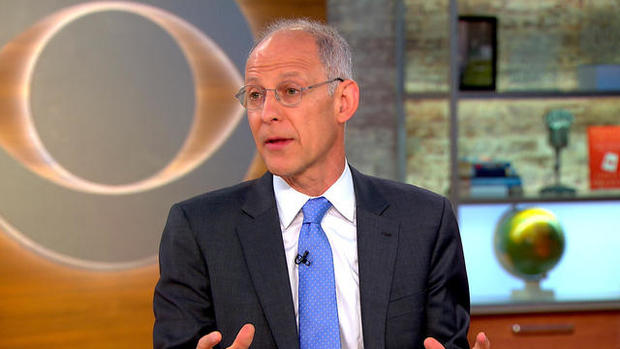Obamacare advisor: "Three very simple things" needed to fix insurance problems
Vice President Mike Pence called on Congress this weekend to repeal Obamacare by this summer. Senate Republican leaders say they plan to pass their version of health care reform by the end of July.
But it will be difficult to get a consensus in the Senate. On Monday Senator Joe Manchin, D-W.Va., said on "CBS This Morning" he has warned President Donald Trump about repealing the Affordable Care Act, saying many West Virginians (including Trump supporters) now have health care that didn't have it before and don't want to lose it.
Dr. Ezekiel Emanuel, chair of medical ethics at the University of Pennsylvania and one of the architects of President Obama's Affordable Care Act, shares his solutions for higher-quality and lower-cost health care in his latest book, "Prescription for the Future" (PublicAffairs). In it he writes: "Although the next few years may be rocky, the American healthcare system will ultimately become better performing and more affordable in the long run."
Appearing on "CBS This Morning," Emanuel agreed there were unintended consequences of the Affordable Care Act that need to be fixed.
"We had problems that were in the bill that we couldn't solve before it got enacted," he said. "It's been around for seven years, so some of the problems have become obvious. Any corporation that would do a massive change like this would make constant adjustments. Because of the paralysis in Congress, we haven't been able to make the adjustments."
When asked what could be done to correct problems with Obamacare, Emanuel "three very simple things" were needed:
"Enforce the mandate; guarantee the subsidies to the insurance companies for cost-sharing, the deductibles and co-pays for families making less than $50,000; and make sure the insurance companies have risk corridors, so if they get too many sick patients, they're protected against that.
"Two of them were in the ACA, but the Republicans undid them. We just have to do those basic things."
- How the GOP health bill would impact Americans on Medicaid ("CBS Evening News," 05/05/17)
- What's actually in the latest House GOP health care bill? ("Face the Nation," 05/04/17)
- Here is how the House GOP health care bill would affect employer-based insurance (CBS News, 05/09/17)
Co-host Norah O'Donnell said, "One of the things that drove opposition to the Affordable Care Act was massive increases in premiums that perhaps the Obama administration did not accurately predict or prevent."
Emanuel replied that, while in some exchanges there have been very steep rises in premiums, "we need to be accurate. The health care inflation rate has actually stabilized under the Affordable Care Act."
He suggested cost-control measures could be implemented. "One of the things I would tell you is the Republican bill has zero cost-control measures in it. They're not going to address affordability. I totally agree with you, affordability is one of the things people care about. And quality — they want to make sure they get good quality. My book is about how can we improve the quality of the system and lower the cost."
"Can you do that without mandates?" asked co-host Charlie Rose. "That's what drove the opposition to Obamacare."
"The answer, simply, Charlie, is no. You need everyone in the system. You can't just have the sick people in the system and healthy people waiting until they get sick before they buy insurance. That's just the simple fact. We're going to have to accept that fact."
Emanuel also had suggestions for what patients should ask their doctors: "The first one is, do they do open access scheduling? Which means, they start the day with half of their appointment slots empty for people who walk in or happen to get sick or happen to find that they have the time and they need that checkup done. Open access scheduling is very important; it's so the doctor doesn't say, 'I'll see you in six weeks,' or double-book you, and everyone is waiting and being annoyed.
"The second one is, are they on some performance measurement plan? Do they have something like patient-centered medical home (PCMH) so that they're measuring their performance and trying to improve it? That is key, because we want doctors who are going to do better and know how well they're doing."
For more info:
- "Prescription for the Future: The Twelve Transformational Practices of Highly Effective Medical Care" by Ezekiel J. Emanuel (PublicAffairs) goes on sale June 6 in hardcover and eBook formats





